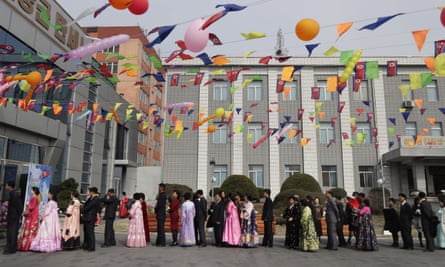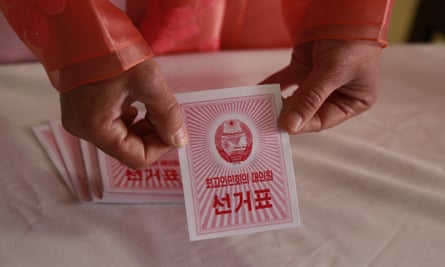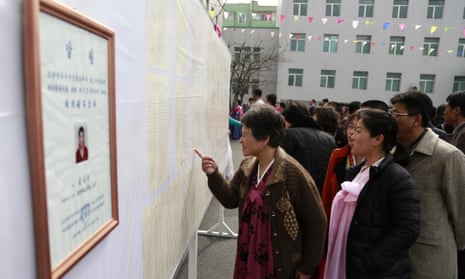North Koreans have voted in an election in which there can be only one winner.
Leader Kim Jong-un’s Workers’ party has an iron grip on the Democratic People’s Republic of Korea but every five years it holds an election for the rubber-stamp legislature, known as the Supreme People’s Assembly.
There is only one approved name on each ballot paper. Voters have the opportunity to cross it out before casting their ballot, but in practice that is unknown.
Sunday’s voting took place in something of a carnival atmosphere in Pyongyang, with children in red neckerchiefs parading in the streets to encourage voters to attend. Bands played at polling stations, where voters lined up in numerical order according to voter lists displayed for days beforehand.
Turnout the last time was 99.97%, according to the official KCNA news agency – only those who were abroad or “working in oceans” did not take part. And the vote was 100% in favour of the named candidates.

“We regard all the people in our country as one family so we will unite with one mind and we will vote for the agreed candidate,” the Socialist Women’s Union official Song Yang-ran said ahead of Sunday’s poll. “We acknowledge no one but the Supreme Leader.”
In an article headlined “Superior Election System of DPRK”, KCNA said the vote was an important occasion “displaying the solidity and invincibility of the socialist system in which the leader, the party and the masses form a harmonious whole”.
Andrei Lankov, a director at the Korea Risk Group thinktank, said the election was the result of “a need to legitimise the government by simulating democratic procedure”.
Soviet-style communist states had a long tradition of holding general elections, Lankov said, even if the ruling party ignored its own rules about holding regular congresses – something North Korea skipped for more than 30 years.

“The early communists sincerely believed that they were producing a democracy the world had never seen, so they needed elections and it became a very important part of self-legitimisation,” he said.
The North is divided into constituencies for the vote. There were 686 at the last election in 2014, when Kim stood in Mount Paektu, a dormant volcano on the border with China revered as the spiritual birthplace of the Korean people. He received a 100% turnout and 100% of the vote, according to KCNA.
Lankov said participation in the poll, like other “obligatory rituals” in the North, does reinforce loyalty to the government and social unity, “because humans love symbolism”.
